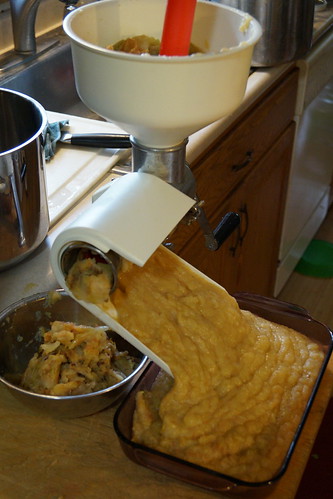And just so you know we're not going to reinvent the process. At the end of this post are a couple links that have good step-by-step instructions, along with pictures to get you going. We'll just add some of our thoughts on making it as easy and painless as possible.
_________________________________
First:
Mixing a couple different varieties of apples together tends to make a better juice, applesauce or pie filling. We don't use any specific types exclusively. Honestly, whatever type of apple we can get free or very cheap is what we use. Buying "seconds" from an orchard can help you reduce the cost. These are apples that aren't perfect looking, but work great for juicing or making sauce. The color of the juice (or applesauce) will be slightly different depending on what varieties you use. It could be a slightly pink or more yellow--we've even had "alien" applesauce as the kids call it because it was slightly more green in color.
Mixing a couple different varieties of apples together tends to make a better juice, applesauce or pie filling. We don't use any specific types exclusively. Honestly, whatever type of apple we can get free or very cheap is what we use. Buying "seconds" from an orchard can help you reduce the cost. These are apples that aren't perfect looking, but work great for juicing or making sauce. The color of the juice (or applesauce) will be slightly different depending on what varieties you use. It could be a slightly pink or more yellow--we've even had "alien" applesauce as the kids call it because it was slightly more green in color.
We prefer any method of juicing that only requires you to chunk up your fruit.
No peeling or coring involved. Just cut off any bad spots there may be.

Third:
Our equipment of choice for juicing is an aluminum Steamer Juicer (shown below). Emily owns two of them thanks to one of her quilter ladies who upgraded to stainless steel.
The thing about equipment is sometimes the price can be intimidating. There is an initial investment, but we feel like the cost is quickly recovered. The ease of use of some of these items are just so phenomenal that it can't be measured. And certainly we have bought equipment slowly over the years. Once you know what you are looking for you can keep an eye out at thrift stores and estate sales. And once people know you can you will more than likely be the first person they contact when cleaning out their relative's home. Renae has scored items on both those accounts.
Four:
When canning with a steamer juicer (per their instructions, pg. 4) there is no need to process the jars any further. Sweet! Adding boiling juice into hot jars is enough to seal it. If you are concerned, then per Ball® you would hot water bath for 10 minutes.
Five:
When we juice apples we also make our applesauce at the same time. The applesauce is made from your leftover pulp. So there is literally minimal waste. We just throw the pulp into our food strainer and the sauce comes out one end and the little amount of gunk the other end.

Super slick. Once again, no peeling or coring involved.
Then depending on the thickness of your sauce you can add back either some water or apple juice to get it the consistency your family prefers.
Without a food strainer you would place the hot pulp in a colander of some type and strain until the sauce is extracted. Renae usually refrigerates hers and then cans it the next day or depending on the amount you make you can just eat it within a few days. Here is how to hot water bath applesauce per the Ball® directions. If you prefer your applesauce more sweet than it naturally is you can add sugar and/or cinnamon to taste. This year we did 7 few pints of cinnamon sugared applesauce, based on the sweetness the kids liked and tasted beforehand. The remaining 16 pints we just left as is--possibly slightly tart, but that is the way they all prefer it. A big thanks to Jo and Frank from Renae for the freebie apples this year.
More Notes:
- We use the aluminum Back to Basics Steamer Juicer. They are between $60 - $70 depending on where you find them. Renae buys the majority of her canning supplies locally at Mills Fleet Farm. The food strainer runs around $35-45.
- A tutorial with pics using a steamer juicer can be found here. This is basically how we do it.
- If you don't have one of these awesome steamer juicers you can still make your own apple juice. Ball
- Here is another link that will show you how to do it without having to peel and core all your apples--which really is the deterrent, we think, to people canning apples in any form.
- Making your own grape juice with a steamer juicer. Emily has a nice free source where she lives and make lots of grape juice for her family.





No comments:
Post a Comment